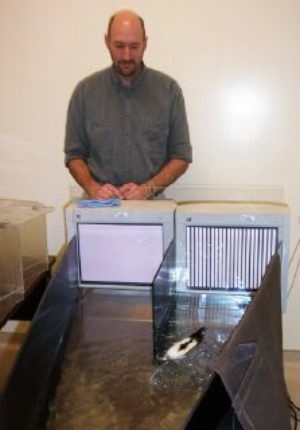Innovation Anthology #47: Professor and Canada Research Chair in Climate Modling and Analysis, School of Earth and Ocean Sciences

One of the major causes of blindness in humans is age related macular degeneration.
Dr. Glen Prusky at the Canadian Centre for Behavioral Neuroscience in Lethbridge is researching new techniques to treat this disease. And he’s using rats that swim.
The rats are trained to recognize the difference between a solid gray computer screen and one that has ever changing stripes. To get out of the water, they must swim towards the stripes.
The number of stripes are gradually increased until that screen looks grey, too, and the rat’s vision essentially fails.
DR. GLEN PRUSKY: We’ve developed a technique that allows us to actually quanitfy what they can see . And what this allows us to do is to use all of the other qualities that a rat has to study various aspects of brain processing. And we have a rat model that mimics that in that these animals start off seeing fairly well, but then over time their vision degenerates. So what we do is we have developed a technique where we can rescue some of that loss.
This rat model allows Dr. Prusky to experiment with possible treatments for macular degeneration before testing them on humans.
Thanks today to The University of Lethbridge
FOR INNOVATION ANTHOLOGY,
I’M CHERYL CROUCHER
Guest
Andrew Weaver, PhD,
University of Victoria, Victoria, British Columbia, Canada,
Sponsor
University of Lethbridge
In 2007 The University of Lethbridge celebrated its 40th anniversary. The U of L campus is home to the world renowned Canadian Centre for Behavioral Neuroscience. The University is also a centre of expertise on water and remote sensing.
For more interviews with University of Lethbridge researchers, check out the website for Innovation Alberta. (2001-2008)

Program Date: 2007-07-10